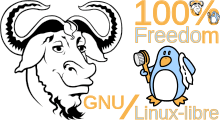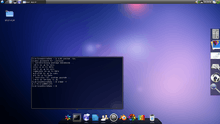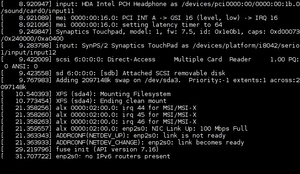Linux-libre
 | |
|
Linux-libre kernel 3.0.66-1 booting | |
| Developer | Free Software Foundation Latin America |
|---|---|
| Written in | C and Assembly |
| OS family | Unix-like |
| Initial release | February 20, 2008[1] |
| Latest release | 4.8.6-gnu[2] / October 31, 2016 |
| Available in | English |
| Platforms | x86, x86-64, MIPS |
| Kernel type | Monolithic |
| License | GPL v2 |
| Official website |
fsfla |
Linux-libre (/ˈlɪnəks ˈliːbrə/) is an operating system kernel and a GNU package[3] that is maintained from modified versions of the Linux kernel. The aim of the project is to remove from the Linux kernel any software that does not include its source code, has its source code obfuscated, or is released under proprietary licenses.
Software components with no available source code are called binary blobs and, as such, are mostly used for proprietary firmware images in the Linux kernel. While generally redistributable, binary blobs do not give the user the freedom to audit, modify or, consequently, redistribute their modified versions.
History
The Linux kernel started to include binary blobs in 1996.[4] The work to clear out the binary blobs began in 2006 with gNewSense's find-firmware and gen-kernel. This work was taken further by the BLAG Linux distribution in 2007 with deblob and Linux-libre was born.[5][6]
Linux-libre was first released by the Free Software Foundation Latin America (FSFLA), then endorsed by the Free Software Foundation (FSF)[7] as a valuable component for the totally free Linux distributions. It became a GNU package on March 2012.[8] Alexandre Oliva is the project maintainer.
Proprietary firmware removal

Methods
The removal process is achieved by using a script called deblob-main.[9] This script is inspired by the one used for gNewSense. Jeff Moe made subsequent modifications to meet certain requirements for its use with the BLAG Linux and GNU distribution. There is another script called deblob-check,[10] which is used to check if a kernel source file, a patch or a compressed sources file still contains software which is suspected of being proprietary.
Effects
Aside from the primary intended effect of running a system with only free software, the practical consequences of removing device firmware that a user is not allowed to study or modify has both positive and negative effects.
Advantages include the removal of device firmware which cannot be audited for bugs, security problems and malicious operations (such as backdoors), or fixed by the Linux kernel maintainers themselves even if they know of them. It is possible for the entire system to be compromised by a malicious firmware, and without the ability to perform a security audit on manufacturer-provided firmware, even an innocent bug could undermine the safety of the running system.[11]
The downside of removing proprietary firmware from the kernel is that it will cause loss of functionality of certain hardware that does not have a free software replacement available. This affects certain sound, video, TV tuner, and network (especially wireless) cards, as well as some other devices. When possible, free software replacement firmware is provided as a substitute,[12] such as the openfwwf[13] for b43, carl9170[14] and ath9k_htc[15] wireless card drivers.
Availability
The source code and precompiled packages of the deblobbed Linux kernel are available directly from the distributions which use the Linux-libre scripts. Freed-ora is a subproject which prepares and maintains RPM packages based on the Fedora kernel.[16] There are also precompiled packages for Debian[17] and derived distributions such as Ubuntu.[18]
Distributions

Distributions in which Linux-libre is the default kernel used:
- Dragora GNU/Linux-Libre[19]
- dyne:bolic[20]
- Guix System Distribution[21]
- Musix GNU+Linux[22]
- Parabola GNU/Linux-libre
- Trisquel[23] - Based on de-blobed Debian kernel releases
Distributions in which Linux is the default kernel used and which propose Linux-libre as alternate kernel:
See also
- Open-source hardware
- GNU Hurd, an operating system kernel developed by GNU, which follows the microkernel paradigm
- LibrePlanet
References
- ↑ blag-announce (February 20, 2008). "[blag-devel] linux-libre". Retrieved November 4, 2014.
- ↑ "Linux-libre". fsf.org.
- ↑ Free Software Foundation (2013), Directory.fsf.org, retrieved 5 January 2014
- ↑ Take your freedom back, with Linux-2.6.33-libre FSFLA, 2010.
- ↑ Alexandre Oliva: Linux-libre and the prisoners’ dilemma FSFLA, 2009.
- ↑ jebba: BLAG :: View topic - Linux Libre BLAG forums, 2008.
- ↑ Free Software Foundation. "Linux (BLOB free version)". Free Software Directory. Retrieved December 6, 2011.
[...] in the interest of freedom, we are providing a link to a version of the kernel in which this proprietary code has been removed so that it is entirely free software
- ↑ Oliva, Alexandre (March 19, 2012). "GNU Linux-libre 3.3-gnu is now available" (Mailing list). info-gnu. Retrieved August 7, 2012.
- ↑ Free Software Foundation Latin America. "How it is done". Linux-libre, Free as in Freedo. Retrieved December 6, 2011.
- ↑ "fsfla - Revision 8200: /software/linux-libre/scripts". Free Software Foundation Latin America. Retrieved December 6, 2011.
- ↑ Delugré, Guillaume (November 21, 2010). Reversing the Broacom NetExtreme's Firmware (PDF). hack.lu. Sogeti. Retrieved April 18, 2012.
- ↑ "LinuxLibre:Devices that require non-free firmware". LibrePlanet. February 5, 2011. Retrieved April 17, 2012.
- ↑ "OpenFWWF - Open FirmWare for WiFi networks". unibs.it.
- ↑ "en:users:drivers:carl9170 [Linux Wireless]". kernel.org.
- ↑ "en:users:drivers:ath9k_htc [Linux Wireless]". kernel.org.
- ↑ Free Software Foundation Latin America. "Linux-libre's Freed-ora project". Retrieved December 6, 2011.
Freed-ora is a sub-project that prepares and maintains 100% Free RPMs that track Fedora's non-Free kernels
- ↑ Millan, Robert (April 23, 2009). "Linux-libre for Debian Lenny". [Debian Mailing Lists] Announcements for developers (Mailing list). Retrieved May 12, 2009.
This is to announce that Debian packages of Linux-libre [...] are now available for Lenny users who want to use them [...]
- ↑ Gündüz, Ali. "Uncle Gnufs' World Famous Home Baked Free Kernel Shoppe". aligunduz.org. Retrieved December 6, 2011.
- ↑ Dragora overview dragora.org
- ↑ jaromil (September 10, 2008). "[LAT] hello, dyne:bolic -rt and freeeee". [Fundación Software Libre América Latina] Linux-audio-tuning (Mailing list). Retrieved December 6, 2011.
- ↑ "GNU Guix Reference Manual: GNU Distribution". Retrieved 6 November 2015.
- ↑ "Musix GNU+Linux libre-rt". Índex of musix
.ourproject (in Spanish). Retrieved December 6, 2011. External link in.org |work=(help) - ↑ "Documentation | Trisquel GNU/Linux - Run free!". Retrieved 2016-03-05.
- ↑ Arch Linux (November 16, 2015). "AUR (en) linux-libre". AUR. Retrieved November 30, 2015.
- ↑ Fossi, Damián (August 24, 2009). "Linux-libre: Resumen del proyecto" [Linux-libre: Project summary]. Forja (in Spanish). Retrieved December 6, 2001.
- ↑ O'Kelly, Tim (April 14, 2009). "Bug 266157". Gentoo's Bugzilla. Gentoo Linux. Retrieved December 6, 2011.
- ↑ "Licenses: Common Setups". Gentoo Wiki. Gentoo Linux. August 6, 2012. Retrieved August 8, 2012.
- ↑ "FreeSlack". freeslack.net. Retrieved August 9, 2016.
- ↑ "installation [FreeSlack Wiki]". freeslack.net. Retrieved August 9, 2016.
External links
| Wikimedia Commons has media related to Linux-libre. |
- Official website
- Linux (BLOB free version) at FSF.org
- Free Software Corsica official .deb builder for the Free Software Latino America since 2010
- APT Repository for Linux-libre at jxself.org

